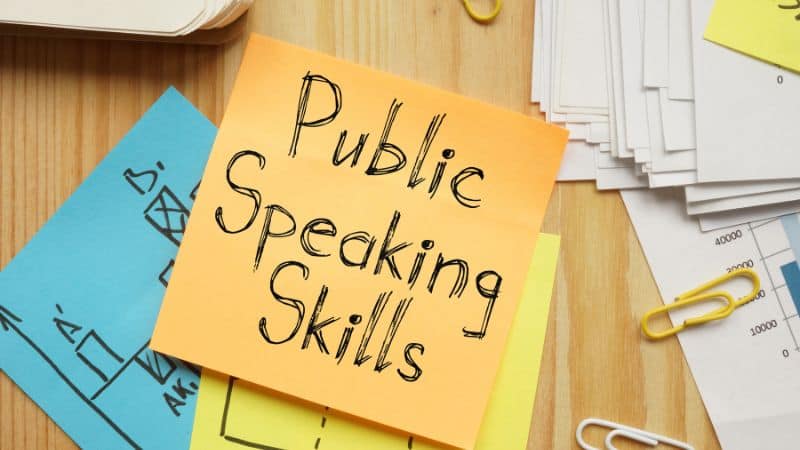Fear of public speaking is real—and pretending it’s not only makes it bigger. This article shows you how to stop fighting fear, name it, and use it as a teacher so you can speak even when your hands shake. Read it if you want to create your stage without waiting to feel “ready,” and start making a difference now.
Public speaking fear is real. To deny it is ignorance. To say that one can eliminate public speaking fear is a disservice. You don’t become a fearless speaker because fears are always present, and they won’t go away. As long as you feel that what you are doing and the people listening to you are important, you will always have fears.
Fear kept humans alive.
Fear of public speaking is in our psychological DNA. Humans learned how to hunt and kill to preserve themselves. They learned how to make a fire to stay alive. They learned to tell stories to their tribes because they fear.
When one tells stories to his tribe, he gives form to his fears. He allows others to experience his fears under their skin without having to endanger their lives. When one tells stories to the other tribe, he fears for his life. He does not know whether he’ll be accepted or killed. Every story, every public speaking opportunity, revolves around our fears.
Stories provide visceral experiences of someone else’s fears.
Remember, every character we like in stories is in a crucible. You cannot have a dystopian story without fear. You cannot have a romantic story without fear. You cannot have any story at all without having to go through fears.
The Marvel Cinematic Universe won’t earn billions without milking our fears.
You can say the same thing for the Twighlight Saga or for the Hungry Games.
Every Shakespearean play revolves around fears.
Fear is everywhere.
The success of community pantries or the ineffectiveness of the government’s response to Covid-19 revolves around fears.

Public speaking is a way to communicate our fear to the world. Public speaking is our way of showing whether we are slaves to our fears or allow our fears to help us seek freedom.
So, I say, you don’t have to be a fearless speaker.
Be the speaker who is aware of fears in your story. Be mindful of your fears. Be mindful of the fears of your audiences.
When you are aware of your fears, you will be able to name them.
Do you fear that your English isn’t good? Do you worry that your lips don’t say the right words? Do you fear that your audience will judge you harshly? Do you fear that your audience won’t buy any of your terms, that they won’t purchase your product or service, or that they accept yours? Whatever you fear about, you have good answers for them.
You don’t fear the flood when you can stand on high grounds or build yourself an ark. But you will always have fears about something else. And you won’t allow each to freeze you.
Here is something that helped me manage my fear even better.
Focus on your audience solve their problems.
When you talk, people want to know what you have to say. They want to see if you can say something that will help them ease their pains and make their fears disappear. The beauty of public speaking is you allow yourself to find solutions to your problems by assisting others in getting the answers to their problems.
It is when you focus on helping others that you convert your fears into courage. That’s sounds mysterious and magical. But that’s how it is.
It is easier to speak when all you want is to help.
About 18 years ago, I was on a bus from Infanta to Manila. A woman, seated next to me, was sobbing. I asked if she has a problem. She said yes, and for two hours, I listened to her. I heard her fears through her stories. I shared my thoughts. She said she was thankful because I was able to help her see things clearly.
But I was thankful to her too. Because while listening to her, I understood what I fear most about my life inside the seminary. I realized what bothers me the most. Her stories give me answers to questions I never asked.
Public speaking is like that too. You give answers to the most critical questions your audience never asked themselves. When we speak, we allow people to see things in a new way when we tell stories. We enable them to figure out that the monster is nothing but a shadow of a cat on top of a tree.
Public speaking fear is as real as many of our fears.
You don’t deny it. You don’t ignore it. You don’t drug yourself to make it disappear. Instead, you will give them names. And then allow fears to teach you.
Yes, public speaking fear is real, and fear is not our enemy.
Fear Less, Speak More
Building public speaking skills will help you fear less about public speaking. You will be able to step out of your comfort zone and become comfortable speaking in a crowd. I recommend that you explore the public speaking courses I designed for organizations.
Still here?
I suggest you read the guide I wrote about public speaking. You will learn techniques to become more confident and then get rid of some of your excuses. Public speaking fear is one of the excuses people give for not speaking.
I’m going to say more of a public speaking fear here.
I want you to know that you don’t even have to be fearless. You only need to learn how to manage your fears.
What I’m going to tell you is so effective that if you start using it, you will realize that you are beginning to become more confident.

Name your fear.
To manage your public speaking fear, you name it.
We are afraid of nameless things.
We are afraid of strangers.
We are afraid of the unknown.
To stop fearing the unknown, or at least manage our fear of the unknowns, find ways to understand.
Some people are afraid of people who hold different beliefs. Not because people of different faiths are bad people. They are afraid because these people not known to them.
For example, when I was younger, I was somehow afraid of Muslims. I learned from comics that they are courageous people, but they are heartless too.
If you’re living in this country, too, some people think that Muslims are terrorists.
Now, this fear is based on ignorance spread by ignorant, if not arrogant, people. I met Muslims who became my friends. They are productive citizens of the country. They are great people.
Once we start naming our fears, we’ll be able to manage them.
Why are you afraid to speak?
Is it because you don’t know if people would judge you as not a good speaker? Who are those people? How sure are you that they’ll be listening for 10 minutes with the sole purpose of judging you?
As far as I know, most, if not, all of us are afraid to speak in front of others. I believe that most of the members of your audience are rooting for you.
They want you to become successful. They want you to achieve. They want you to finish your speech.
Of course, it is possible that a few members of the audience are fault-finders, although they cannot deliver a meaningful presentation.
You need to know precisely why the reasons behind public speaking fear.
Are you afraid to speak in front of others because your English is not good? Well, my English is not good too.
And I think most people in the world don’t speak good English. Watch Hollywood movies. You will see that many Americans themselves are not very good at English.
Many of them have not gone through an excellent education like most of you.
It’s not the language that we need to worry about.
Why speak in English?
Why speak in English when your audiences are Filipino.? They can understand you better when you speak in Filipino or in their dialects.
You do not need to make it difficult for you. Do make it difficult for your audience.
I hope this little addition to this post helps you.
Please understand that manage our fear, we need to name our fear and learn more about it. We need to find a ways to understand.
Seek to understand because understanding will give you the wisdom to know what you can or cannot do.
If you’re tired of knowing but not doing…
Let’s make one shift easier to live daily.
→ Shift Experiences






